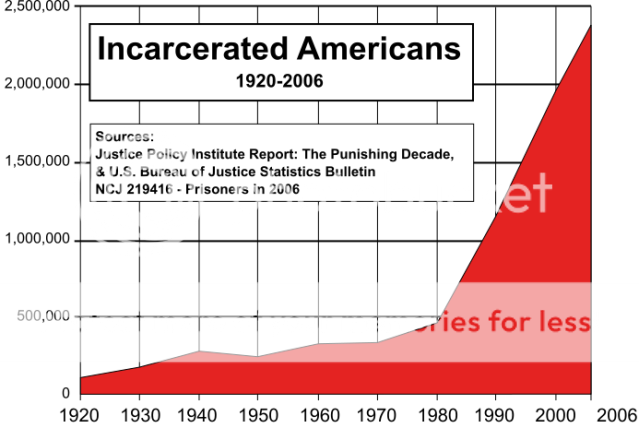I see two uses for prison:
1) For permanently holding people who can't be trusted in society, psychopaths and the like.
2) As a deterrent. If you commit a crime you will lose your freedom and get a permanent stain on your record, making it harder to get a job and be successful.
Once it fails as a deterrent and people commit smaller-scale crimes like theft, that's where it falls down. Prison begins a cycle of re-offending in more than half of cases, or at least doesn't do anything to curb it. The justice system as a whole doesn't address the factors that cause people to commit crimes, which are mostly social problems. Most of the people in prison are not bad people who actively decided to go out and cause distress and harm to others, but are disadvantaged people who don't have the same opportunities as others to succeed legitimately. Our 'justice' system makes it even harder for them by making them less attractive to employers and to other members of society.
Some stats I've found, though I haven't checked the original sources:
1) For permanently holding people who can't be trusted in society, psychopaths and the like.
2) As a deterrent. If you commit a crime you will lose your freedom and get a permanent stain on your record, making it harder to get a job and be successful.
Once it fails as a deterrent and people commit smaller-scale crimes like theft, that's where it falls down. Prison begins a cycle of re-offending in more than half of cases, or at least doesn't do anything to curb it. The justice system as a whole doesn't address the factors that cause people to commit crimes, which are mostly social problems. Most of the people in prison are not bad people who actively decided to go out and cause distress and harm to others, but are disadvantaged people who don't have the same opportunities as others to succeed legitimately. Our 'justice' system makes it even harder for them by making them less attractive to employers and to other members of society.
Some stats I've found, though I haven't checked the original sources:
Prisoners are thirteen times as likely to have been in care as a child, thirteen times as likely to be unemployed, ten times as likely to have been a regular truant (Reducing Re-offending by ex-prisoners, Social Exclusion Unit, July 2002, p8)
Many prisoners have poor skills and little experience of employment, few positive social networks, severe housing problems, and all of this is often severely complicated by drug, alcohol and mental health problems. (Reducing Re-offending by ex-prisoners, Social Exclusion Unit, July 2002, p8).
It is more difficult for ex-offenders to gain employment whilst they are still on licence or recently released. In a survey, only 14% of ex-offenders in employment were employed within two years of leaving prison (CIPD 2007)
Do you think the current system of imprisoning criminals is good?
Do you think imprisoning criminals is okay, but more should be done to help and rehabilitate them whilst inside?
If you don't like the current system, what alternative do you propose?

